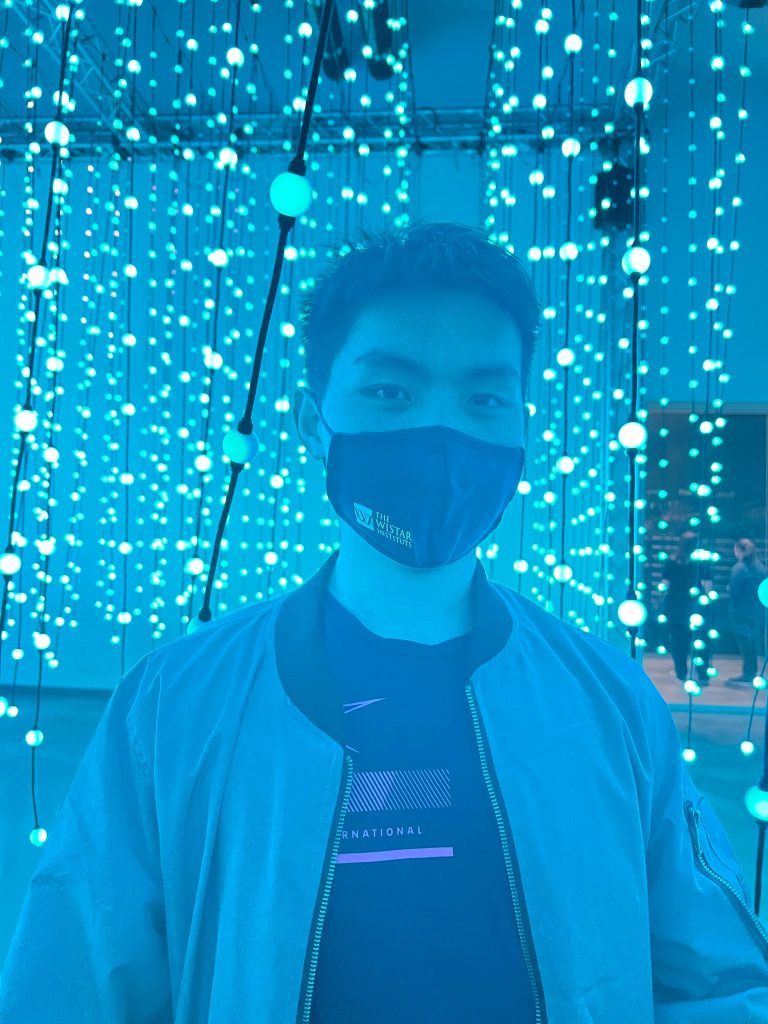Vincent Ni, COL ’25, Brooklyn, NY

This past summer, I had the opportunity to continue working in the lab of Dr. Meenhard Herlyn at the Wistar Institute, extending my part-time work to a full-time position during the summer months. During the school year, I received mouse handling training. With more practice opportunities during the summer months, I began getting acquainted with techniques such as IP injection, dissection, and oral gavage. Through this process, I came to appreciate the many ethical issues when using live animals as test subjects. One of the mouse operations I was involved with was the isolation of teratoma tumors to extract CD34+ cells after tending to these mice for 10+ weeks. Very often, we don’t get the right cell type that we were looking for. However, we won’t know until we go through the isolation process. Hence, this process was very much a lesson for me that science, especially biology, requires as much patience as it is unpredictable.
Within our team, I was also tasked with a personal pet project involving the promoter transformation of our many transcription factors of interest. With guidance from my mentors and repeated trials and errors over multiple weeks, I was devised a weekly outline for batch transformation with checkpoints after each step to ensure high fidelity. Although the transformation process isn’t overly complicated, balancing it with the mice and cell maintenance works with coordination was always something to keep in my mind.
Outside of my 9-5 job at Wistar, I dedicated many of my nightime of this summer to a fellowship at Alliance of Citizen Engagement (ACE), a nonpartisan policy thinktank. With a focus in public health, particularly the American federal healthcare laws, I conducted in-depth nonpartisan analysis of the pros and cons regarding several impactful policies. Specifically, my briefs started with an analysis of the Affordable Care Act (ACA)’s impact on healthcare coverage in the US since its implementation. One thing I had to keep cognizant of is how the ACA wasn’t necessarily implemented as expected partly due to the 2012 NFIB v. Sebelius ruling and a change of presidential administration in 2016. Therefore it’s not completely fair to attribute coverage changes as if the ACA was implemented fully. After delving into the ACA’s Medicare Part D rule changes, I decided to compose a brief on the outpatient prescription drug program. By looking into relevant ongoing news on the topic, I also decided to dedicate my final brief to the Inflation Reduction Act’s healthcare provisions and its potential impacts. Ultimately, I can say that this fellowship helped me cement my interest in domestic healthcare policy into something I would consider a career in.
As the semester nears, I’m excited about continuing my work at Wistar and getting more
involved in our multiple ongoing projects. In growing to be more comfortable and clear-headed in the lab, I’ve come to have a thought-out schedule for my time and backup plans when things don’t go as expected. On the other hand, I’m also excited to explore my interests in healthcare policy both in and outside of the classroom. All in all, all of this wouldn’t have been possible without Career Services’ support, giving me a fresher perspective on the subjects that interest me.
This is part of a series of posts by recipients of the 2022 Career Services Summer Funding Grant. We’ve asked funding recipients to reflect on their summer experiences and talk about the industries in which they spent their summer. You can read the entire series here.




